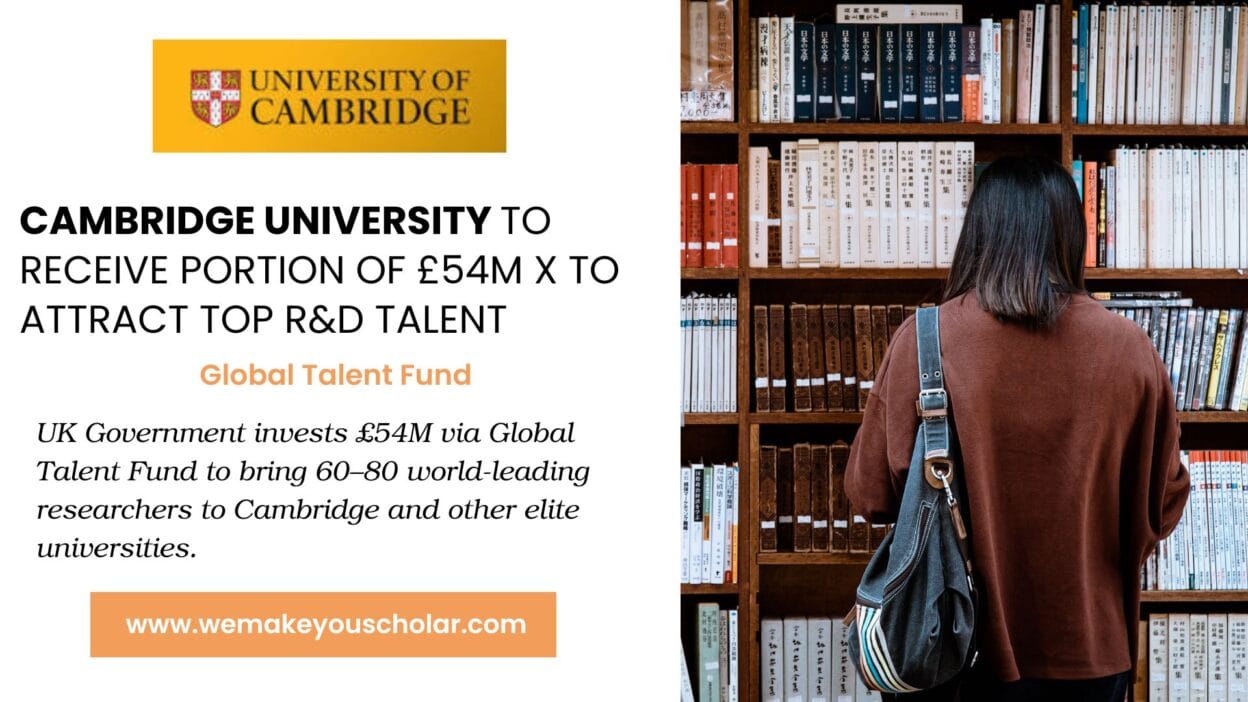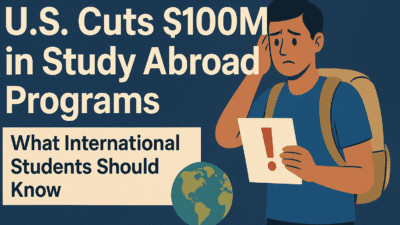Cambridge University to Receive Portion of £54M Global Talent Fund to Attract Top R&D Talent
The Global Talent Fund is a five-year, £54 million government initiative, administered by UK Research and Innovation (UKRI), aimed at recruiting 60–80 of the world’s top researchers and their teams to UK institutions. It focuses on eight priority sectors identified by the Industrial Strategy, including AI, life sciences, quantum computing, and engineering biology.
University of Cambridge is among 12 leading UK research institutions selected to receive an equal share of the fund to support relocation and research costs.
Why It Matters for Cambridge
Cambridge’s history is rich with international research breakthroughs—from César Milstein’s antibodies to Charles Kao’s fibre optics and Ernst Chain’s penicillin development—all driven by overseas talent.
This new fund will help maintain Cambridge’s competitive edge by:
Attracting world-leading R&D teams
Covering salary, visa, relocation, and research expenses
Enabling cutting-edge breakthroughs in future-defining sectors such as AI, quantum, and bio-tech
Voices from Leadership
Professor Deborah Prentice, Vice-Chancellor of Cambridge:
“This investment will be pivotal in securing and supporting international academic expertise…strengthening the strategic opportunities the University is seeking to catalyse”
Science Minister Lord Vallance emphasized:
“Genius is not bound by geography…bringing these innovations to life…here in Britain…will be critical to delivering this Government’s Plan for Change.”
Chancellor Rachel Reeves added:
“The UK is home to some of the world’s best universities…Supported by our new Global Talent Taskforce, the Global Talent Fund will cement our position…”
How the Funding Breaks Down
£54M spread over five years beginning 2025–26
£54M is part of over £115M total government funding aimed at boosting scientific talent
Each of the 12 institutions receives equal funding, covering:
Researcher+team salaries, relocation, visa, and research costs
No institutional match funding is required
Targeted Research Areas
The fund supports recruitment in the UK Government’s eight Industrial Strategy priorities, including:
AI & digital technologies
Life sciences & medicine
Quantum computing
Engineering biology
Advanced manufacturing
Clean energy
Creative industries
Professional & business services
Impacts of these sectors are projected as:AI: +1.5% GDP per year (~£47B pa)
Quantum: +£11B by 2045
Engineering biology: global output of £1.6–3.1T by 2040
UKRI’s Broader Vision
As part of UKRI’s mission for an “open, dynamic, and diverse research system,” the Fund aligns with global engagement goals.
This includes support for Global Talent visa endorsements and cooperation with the Global Talent Taskforce to ease recruitment and onboarding for international R&D teams.
How Cambridge Will Deploy the Funding
Cambridge will:
Identify R&D teams in high-priority sectors in collaboration with departments
Provide visa support, relocation, and integration services
Offer lab space, equipment, and long-term funding
Use the fund to complement initiatives like the Spar̈ck AI scholarships, which provide master’s funding across nine UK universities
Global Perspective: Cambridge & Beyond
Cambridge joins other premier institutions like:
University of Warwick with £4.35M for Creative Industries R&D
John Innes Centre targeting agritech via £4.5M+
Together, they form a national network of R&D hubs, driving UK competitiveness and innovation.
FAQs: What Researchers Should Know
Q1: Who can apply for Global Talent Fund positions at Cambridge?
Open-call positions will be advertised by individual departments and research centres—both senior and early-career R&D teams are eligible.
Q2: How are funds used?
Each institution receives equal funding (over five years) to cover relocation, visas, research setup, salaries, and team integration costs.
Q3: Does Cambridge require matching funds?
No: No institutional match funding required, UKRI will cover 100% of such costs.
Q4: How does the Global Talent helps in visa processing?
The Fund covers visa costs and endorsements expenses, this will help in smooth relocation for researchers and dependents.
Q5: When will positions open?
Recruitment will begin in late 2025; check Cambridge’s Research at Cambridge portal for roles in AI, biotech, quantum computing, and beyond.
Action Tips for Prospective Researchers
Tip 1: Follow Cambridge Research Job Boards
Sign up to Cambridge researcher newsletters and job alerts for early notification.
Tip 2: Reach Out to Faculty
If your work aligns with AI, quantum, biotech, or clean energy—contact potential principal investigators and labs directly.
Tip 3: Prepare for Visa & Relocation
Start visa paperwork and relocation plans early—it can take months to process Global Talent visas.
Tip 4: Highlight “Fit” with UK Strategy
Emphasize how your work advances Industrial Strategy sectors (AI, life sciences, etc.) in applications and interviews.
Other Related Posts
Unlocking Innovation: Canada’s $1.3B Boost for Researchers & Projects in 2025
What the Republicans’ New Policy Bill Means for Higher Education in 2025
The above was originally posted and taken from Cambridge University.




